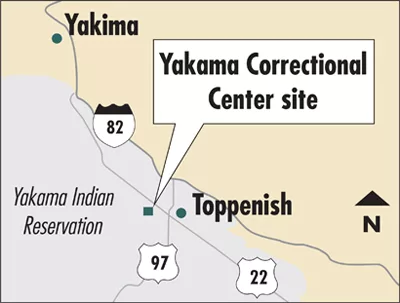Graham in line for $9.7 million jail project
114-bed facility for Yakamas will focus on rehabilitation, culture, rather than punishment

Graham Construction & Management Inc., of Spokane, has submitted an apparent low bid of $9.7 million for a contract to build a new jail for the Yakama Indian Nation, the tribe says.
The tribe opened bids on June 4, and the Yakama Tribal Council is expected to approve the winning bid for the project on June 21, says John Goodrick, the tribe's project manager. He says he expects construction to start by August and to take about 14 months to complete.
The project is being funded by a public safety grant awarded through the federal stimulus act. It was among projects valued at a combined $236 million awarded nationwide to American Indian tribes by the U.S. Department of Justice last September, and it will be one of the first of those projects to be built, Goodrick says.
Other bidders included McAlvain Construction Inc., of Boise, with a $9.9 million bid, and John Korsmo Construction Inc., of Tacoma, with a $10.1 million bid.
The 40,000-square-foot, 114-bed jail, to be called the Yakama Correctional Center, will be constructed just west of the tribe's Yakama Legends Casino, about 25 miles southeast of the city of Yakima and about 200 miles southwest of Spokane.
The jail will hold adult and juvenile male and female offenders, and will employ 50, Goodrick says.
The tribe intends to support rehabilitation at the facility through an emphasis on cultural and traditional values rather than merely warehousing inmates, he says.
"The tribe feels offenders don't need punishment so much as correction," he says. "Through counseling, education, and guidance, they will try to help offenders get hold of their Native American ways and correct themselves."
The tribe expedited the project by modifying the design used to construct the Colville Tribe's 25,500-square-foot corrections facility that opened in 2005, he says. EKM&P, of Omaha, Neb., which designed the Colville facility, also designed the Yakama project, he says.
The facility will include space for inmate segregation, education, medical and mental health services, recreation, social visits, and cultural activities, a Justice Department description of the project says.
Related Articles


_c.webp?t=1763626051)
_web.webp?t=1764835652)

